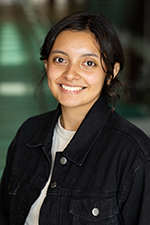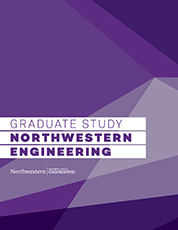A New Spork to Support Your Academic Goals
An academic adviser’s kindness sparked the idea behind Yaritza Chavez’s (EDI ‘24) Thesis project.
Chavez recently graduated from Northwestern's Master of Science in Engineering Design Innovation (EDI) program. Her final presentation featured a planning and scheduling app tailored for neurodivergent people called Spork.
 The project evolved from a story Chavez heard by an incoming first-year student whose academic adviser met with her weekly to help her plan each day's schedule.
The project evolved from a story Chavez heard by an incoming first-year student whose academic adviser met with her weekly to help her plan each day's schedule.
“I wanted to figure out how to get that type of personal service to every student,” Chavez said. “For a lot of neurodivergent people, their needs are fluid, and so a rigid schedule can feel restricting. Spork is meant to work with your brain to support you as you pursue your academic goals and grow alongside you.”
The app is designed to replicate the experience Chavez heard time and again through her research. She interviewed many neurodivergent students who leaned on their friends to help them study, stay focused, and hold them accountable.
Spork would mirror the supportive camaraderie, Chavez said.
The concept for Spork is built on artificial intelligence (AI) that generates tailored study plans based on a user’s study habits and schedule. The app eases the burden of solitary planning by actively collaborating with a user to design optimal study routines refined for what their individual brain needs to succeed.
“The best part about Spork is that it would be available to all students, regardless of diagnosis status,” Chavez said. “It’s meant to be an unlimited accessible support for students to manage their academic demands so they can pursue their goals with confidence.”
Completing the project helped Chavez build her own confidence.
During Thesis, EDI students dive deeply into a topic of their own choosing. Each student is encouraged to explore a space that draws on their areas of interest.
“I knew I wanted to do something within the education sphere, and I’ve always had an interest in designing for accessibility,” she said. “In a way, this project was a blend of my two passions.”
Chavez initially intended to examine the relationship between students and professors and design interventions for students to better advocate for themselves. As her research continued, her plan evolved.
"I ended up changing directions because I felt there was a greater conversation that needed to be had about the culture within higher education," she said, "and who we imagine is allowed to be in those spaces."
That evolution is designed into the structure and process of Thesis Studio. Over two quarters, students apply the methods and knowledge learned during their time in the EDI program to produce a set of final deliverables culminating in a public presentation.
Many students plan to continue work on their Thesis project post-graduation and move their research from concept to reality. Thesis gives students a window into their own abilities and demonstrable examples of what they’ve learned during their time in the EDI program.
“The most valuable part of Thesis for EDI students is being able to discover more about yourself – figuring out what you’re passionate about, how you like to work, developing your own design philosophy, and recognizing where you can’t do things on your own,” she said. “It’s an experience that leads to a lot of growth as a designer. Even in my work going forward, I will continue to talk about what I learned in the duration of this project.”
The biggest lesson? Success comes from collaboration, even on independent projects.
“I asked for feedback and help from others whenever I could, and I know my peers were doing the same,” she said. “The amount of emotional support from my peers was critical to making it through the project.”

